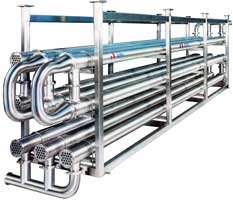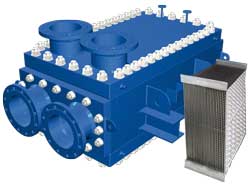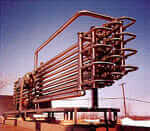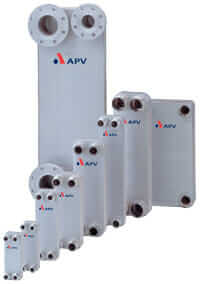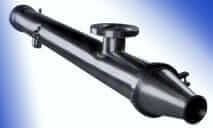Description
APV ParaTube (tube-in-tube heat exchangers) can be supplied with either straight tubes or corrugated tubes. They all follow a similar construction format with a single tube or number of smaller tubes enclosed within an outer shell. They are available in the four configurations and can be manufactured as a fully-welded design, with removable end caps or with built-in thermal expansion protection of O-rings or packing between the shell and tube bundle.
Product range APV ParaTube |
|
| Corrugated Double Tube (CDT) – The APV ParaTube CDT consists of a single corrugated tube concentrically positioned in a larger diameter outer tube. Tube diameters vary according to flows and the size of any particulates which may be present. The double tube offers a completely unrestricted flow path down the center tube. This design makes them particularly well suited for heating or cooling products with very high pulp or fiber content, or products which contain a substantial quantity of particulates which must be processed with a minimum loss of identity. | |
| Corrugated Triple Tube (CTT) – The APV ParaTube CTT consists of a center tube concentrically positioned in a middle tube which is concentrically located in the outer tube. Stainless steel spacers are used to keep the tubes properly separated. The result is an annular space where heat transfer effectively occurs from both sides. The triple tube is generally applied to high viscosity or Newtonian fluids which may or may not contain small fibers or particulates. | |
| Corrugated Quadruple Tube (CQT) – The APV ParaTube CQT is a unique design that allows significant flexibility in annulus gap to optimize heat transfer and pressure drop. It allows balancing of flow rates and pressure drop ratios between the inner and outer annulus. This feature is critical to successful heat transfer of laminar and/or non-Newtonian fluids, particularly when applying it to product-to-product regeneration. | |
| Corrugated Multi Tube (CMT) – The APV ParaTube CMT consists of smaller diameter corrugated tubes aligned in parallel within a larger diameter outer shell. Because of the number of tubes within a shell, this design maximizes heat transfer surface in a given volumetric space. The CMT is ideal for heating or cooling duties of lower viscosity products or those containing whole juice cells or pulp. Regeneration is indirect, and we can provide conical tubesheet on the inlet of each module for juice with some pulp. | |
Features/Benefits:
|
|

